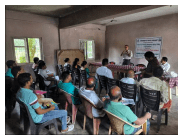The Department of Animal Husbandry and Veterinary Services (AH&VS), in collaboration with the Agricultural Technology Management Agency (ATMA), has conducted a two-day training programme in Vivekananda Pur, Little Andaman, aimed at enhancing livestock productivity through improved fodder cultivation practices. The event, held on August 12 and 13 at the Panchayat Community Hall, brought together local farmers keen to adopt scientific methods tailored to the region’s agricultural landscape.
Pradhan of Vivekananda Pur, Parimal Mondal, inaugurated the programme and highlighted the challenges of growing fodder grass in areas dominated by arecanut plantations. He suggested controlled intercropping methods to avoid interference with arecanut collection and called for easier access to poultry and duck inputs for local farmers.
The Senior Veterinary Officer of Hut Bay welcomed participants and outlined the importance of fodder production in sustaining healthy livestock and improving yields. Technical sessions over the two days covered soil preparation, seed selection, intercropping strategies, and maintenance practices. Participants were provided with reading materials, plastic buckets, and Super Napier fodder cuttings to support practical application.
The training combined theoretical knowledge with hands-on demonstrations, ensuring that farmers could apply the techniques to their own land. Organisers emphasised that improved fodder cultivation directly contributes to better livestock health, milk yield, and farm income, while reducing reliance on imported feed.
This initiative forms part of AH&VS’s broader efforts to promote sustainable animal husbandry in the Andaman and Nicobar Islands. The department plans to replicate the training in other parts of the islands, ensuring that farmers have access to essential resources and updated agricultural practices.
The active participation and feedback from the farmers underscored their commitment to enhancing productivity and aligning with the administration’s rural development goals. By equipping farmers with practical, location-specific skills, the programme is expected to make a lasting impact on livestock management in Little Andaman and beyond.





